by Jenny Rose | Dec 7, 2017 | A Flourishing Woman, Mind
Scrying is “the practice of looking into a suitable medium in the hope of detecting significant messages or visions.” (Wikipedia)
My laptop has developed the Technical Flu and is in the shop. I’m chagrined to discover how much I depend on it. It’s the only portable device I have, as I still resist the pressure to obtain even a cell phone. Suddenly, my access to music, DVDs and the Internet is restricted. I know, it’s a first world problem, but I’m not complaining. I whined for the first few days, but as I sit down to write this post what I mostly feel is a kind of grateful wonder.
In my laptop’s absence I find a lot of quiet. Without my usual entertainment and distraction, my ears, eyes and attention are freed. As I work on the second book of my series, I’ve picked up a sketch pad and colored pencils in order to create a map of my very complex world where the myth, fairy tale and oral history of several cultures meet and interact. Without access to my one-dimensional outline on my word processor, I recognize the need for a two or even three-dimensional model to truly show all the connections and correspondences of the series. I’ve discovered new depths to my creative vision and work and considered new ways to approach it.

Photo by Ludde Lorentz on Unsplash
Folk and fairy tales often speak of depths. Caves, tunnels, wells and stairways descend to other places, magical underground kingdoms where evil beings lurk and flex their destructive forces and unexpected but powerful animals or crones or fairies save the hero or heroine. Gypsies, oracles, shamans and seers scry crystal balls or pools of water, smoke, fire, mirrors or stones. Runes whisper messages. Tarot cards reveal enigmatic insight.
We are in the depths of seasonal darkness now. In two weeks the light begins to return. Here in Maine the day starts to fade at 3:30 in the afternoon and an hour later it’s full dark. What do the depths of darkness hold? What lies between the stars? What dreams unfold behind our eyelids during the long sleeping hours? What lives, hunts and dies in the winter-bare forests under the moon? What stirs in the dark sea’s deeps?
If we could separate ourselves and all those around us from our tech and toys, if we could all free our eyes from the screen and our ears from the noise and look, clear-eyed and undistracted, at those around us, what would we see in one another? If we were forced to sit quietly at a window with nothing but a chair for company, what might we discover in the world around us? If we stand naked and alone in front of a mirror and look into our own eyes, what looks back at us?
What lies in the depths of longing and loss? What lies denied and amputated in the deeps of a soul? What waits to be rediscovered or reclaimed, healed or released?
Some of the deepest, darkest, coldest and most fearsome depths in my life turned out to be only ankle-deep after all. Ankle deep and unpleasant, but, once challenged and understood, pathetic and sad rather than powerful and terrible. Shallows pretending to be depths. A leech or two instead of a sea monster.
Other shallows are so seductive, so enticing, so shiny, that we joyously bare our feet and run into them, gradually wading farther and farther from shore, our attention captured, our gaze fixed on their captivating surface, and there we stay until we die.
All my life I’ve been told I’m too intense. I’ve never known exactly what that means, and the criticism never fails to both hurt and irritate, especially as I can’t get more information. Asking probing questions is simply an example of my obnoxious intensity, it appears.
I wonder this morning if what people are expressing is discomfort with my love for the depths, for the dark where miracles happen, for the hidden thing, be it dreadful or dazzling. Questioning is falling out of social favor. Political correctness shackles and gags us. The shiny shallows are the place to be, where text messages, emojis and ‘likes’ glitter and frolic and algorithms and ideology teach us what to think, believe, value and buy.
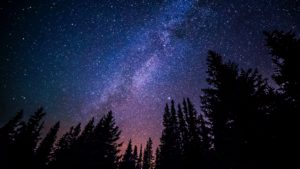
Photo by Ryan Hutton on Unsplash
I can be seduced by the shallows as well as anyone, and have several times been fooled by them, but somewhere inside me resides a wild thing, a female creature that glories in the power of the dark and deep and always returns to passion, emotion, and creativity. I want to dive into the night sky and swim naked among the stars and nebulae. I want to see and be seen, hear and be heard, know and be known. I navigate with a mouthful of questions and an insatiable curiosity. I don’t want life to be pretty and distracting and shiny. I don’t want all my dreams to be sunlit and filled with flowers and kittens.
I want life to be as it is, smelling of musk and blood and starlight, dark and powerful and magnificent beyond my puny imagination. I want the hot eroticism of life and the torn flesh of death. I want to embrace the unknowable, kiss the lips of mystery and reclaim and wield the full power of my fear.
I choose to live in the depths.

Photo by Christopher Campbell on Unsplash
All content on this site ©2017
Jennifer Rose
except where otherwise noted
by Jenny Rose | Dec 1, 2017 | A Flourishing Woman, Self-Love
Relationship is the finest crucible I know for personal growth and transformation. Unfortunately, it’s also the best crucible for abuse and destruction, but I no longer focus on that aspect of connection with others. My relationships now are based on growth, not destruction. I have promised myself this.
As my partner and I slowly move toward shaping a life of self-sufficiency and holistic collaboration with our land and community, we are experiencing (naturally) many unwelcome pauses and fallow periods as we wait on favorable weather, the scheduling needs of others or the availability of funds.
I’ve noticed during these frustrating pauses my partner serenely deals with the work of the day and then is perfectly happy to sit on our sagging couch, a book in one hand, the TV remote in the other and the cat velcroed to him, occasionally getting up to feed the wood stove.

Photo by Lilly Rum on Unsplash
It drives me nuts. How does he do that?
We had a conversation about it over breakfast recently.
He’s hanging out and waiting for the stars to align so we can begin to move forward again. That might come in the form of some income, a phone call, a stretch of really warm days, or who knows what other miracles. He figures it will all work out, one way or another, in time, and meanwhile he might as well relax and enjoy life.
I, on the other hand, from my earliest memory, make Deals with the Universe. My Deal is that I’ll Be Good in order to get what I need to survive. Being Good is specifically defined.
- I will not complain, whine, want or need anything I don’t have.
- I will hoard what I do have and be grateful, because I have so much more than many others.
- I will work as hard as I can at all the tasks that can be done right here, right now, even if it’s only scrubbing the kitchen floor on my hands and knees or cleaning out closets.
- I will not wait, hope, dream. I will act. Now!
- I will not make excuses, procrastinate or (God help us) relax.
- I will never admit to feeling afraid or anxious or impoverished in any way. Being truthful about our experience is “airing dirty laundry,” which is shameful and vulgar.
Somewhere inside me is a hysteric who knows my partner is wrong. Sitting on the couch means he’ll never see his dreams come true. He won’t deserve to see dreams come true, because he’s not doing anything to help himself, to prove himself worthy of good things. He’s not hoarding what we have. He’s got a light on for reading and the TV on and he’s putting wood in the stove as though those six cords out in the barn will last all winter! (They will.) He’s not doing all the tasks that could be done. He’s failing the test, failing his side of the deal, and we are screwed.
All this panic and fear impel me to work harder and harder at everything. At anything. I must demonstrate to the Universe that I’m not a slacker, a sponge, an ingrate. I must also make up for his blasphemy of sitting on the couch, because we hold dreams in common, and we can’t manifest the lives we want without each other. Clearly, I must Be Good for both of us.
The infuriating but inescapable truth is that I can’t honestly say my Deals with the Universe work better than my partner’s approach. I’ve always had what I’ve needed to survive, but so has he!
It’s not fair.
Then, this last week I read the best essay I’ve come across on rape culture and its effect on women. The writer perfectly expresses much of my longing and the difficulty of allowing oneself to be fully and powerfully female. I feel more and more tension around this in our climate of hysterical political correctness, labeling, jargon and sloppy thinking. The increasing visibility of symptoms of rape culture give me hope that in some quarters there is a will to change, but will it be enough? Will we ever really see an equal playing ground for all people? Not necessarily the same playing ground, but equal in contribution and value, equal in respect, resource and power?
I don’t know.
Anyway, I went for my morning walk with the essay on rape culture and my Being Good rules rattling around in my head. There were snowflakes in the air under a mostly cloudy cold sky with occasional gleams of sun. The river flowed quietly along and I sat for a while under the trees to watch the snow fall in the water.

Photo by Joshua Fuller on Unsplash
What if, I wondered, instead of my exhausting and not-notably-effective list of what Being Good entails, I changed my Being Good Deal with the Universe to living the truest and fullest expression of myself possible? What if that included the entirety of my wants, needs, feelings, thoughts, creativity, passion, power and sexuality? What if that included all the great and small activities and experiences that give me pleasure? What if I gave my obnoxious, persistent and compulsive judgement a sabbatical, with an option for permanent retirement?
I was so intrigued by this that I’ve been playing with it for the last few days. In that time my laptop developed technical problems and is in the shop, so I’ve been without my usual habits, tools and routines. This post was not published first thing Thursday morning. I notice that life manages to continue in spite of it. I’ve read, walked, laid on my back on the ground in the sun, meditated, gone swimming and luxuriated in a hot therapy pool, done Tai Chi and ordered my favorite body oil. I’ve listened to Christmas music. I’ve eaten a bowl of ice cream. I’ve had an honest conversation with two women I like and admire. I’ve taken walks with my partner. This looks much like my usual life, it’s just that currently I’m allowing myself to enjoy my experience without shame, expectation or judgement.
Life is a lot easier and much more fun under my new (and simplified) Be Good Deal with the Universe. Will the Universe frown or smile upon this new Deal?
Who knows? Maybe it’s none of my business. Maybe the Universe isn’t looking over my shoulder, recording every action and thought, maintaining a cosmic scorecard. Maybe the Universe is sitting on the couch, alternately reading science fiction and watching reruns of Star Trek on Syfy and paying absolutely no attention to me whatsoever, and all my frenzied flapping around is just a waste of energy.
Sometimes I make myself tired.
I think I’ll go sit on the couch.

Photo by Josh Applegate on Unsplash
All content on this site ©2017
Jennifer Rose
except where otherwise noted
by Jenny Rose | Nov 2, 2017 | A Flourishing Woman, The Journey
In the Neopagan Wheel of the Year, Halloween is the modern secular version of Samhain (SOW-in), the last harvest festival, a time when the veil between the spirit and corporeal world is thin and we prepare for the peace and rest of winter. It’s a time to let go of that which no longer serves us.

Photo by freestocks.org on Unsplash
This year Samhain was ushered in by the remains of Hurricane Phillippe, which battered Maine and other parts of the Northeast with high wind and heavy rain.
Wind is an old familiar of mine, as the place I came from in Colorado was extremely windy. There, the wind blows relentlessly for days and nights on end sometimes, a steady roar from one direction that fills the air with sand, grit, trash and other debris, frequently exceeding 60 mph and occasionally 70 mph. It’s the kind of wind nobody wants to go out in and it ground away at our nerves, making us feel housebound and irritable enough to climb the walls. It sucked all the moisture out of the ground, the plants and our skin. It tore roofs off sheds, blew down fences and trees, closed vulnerable highways and sent trampolines into the air.
The gale we had here this week was a different kind of wind. It came from all directions in gusts. It made the house groan and the trees thrash. It tore shingles off the roof and downed hundreds of trees. More than five inches of rain fell in billowing curtains. As a result, many thousands of people lost power, roads are blocked and it may be the end of the week before all the repair work is finished.
The storm hit us in the wee hours. We were awakened by an exploding power transformer somewhere close by, probably because of a fallen tree.
When I went out for my morning walk, I found change.
Several large trees have snapped off and lay or lean, the exposed raw wood pale and jagged. One less tree in a patch of thick forest is a subtle change to my eyes, but to the life surrounding it for several feet in every direction it’s a dramatic turn of events. It changes the light. It changes the nutrient demand underground. It feeds the mycelium and other organisms that will break down the wood. It gives new opportunity to young trees and other plants.
All the trees that came down on our land looked unhealthy, and several were rotting in place and collapsed rather than sheared off. Lots of dead branches tore away, too, and cones were flung far and wide.
As I walked, I reflected on change. Millions of people are experiencing unprecedented storms now. In just a few hours, whole lives are swept away by powers we cannot control. But the wind of change can also be a breeze, a zephyr we hardly notice, even if we practice daily presence with ourselves and our surroundings. Change is always with us, as inevitable as death.
More often than not, I fight with change. I don’t mind the idea of change, per se, but I want it to be on my terms. I want to control it. In my own life, though, change has often come unexpectedly and catastrophically, sometimes in the form of a seemingly insignificant moment in which I suddenly see. I suddenly assimilate a vital piece of information. A veil tears and I discern what lies behind it. In an instant, everything changes, and at the same time it doesn’t, at least not more than usual.
Yet I am changed, and I can never go back.
In a few days, things will normalize in Maine, but the landscape is altered now. It will never quite be the same again, although our experience was trivial compared to Texas, Puerto Rico and many other places.
Walking our boggy fields alongside the river, my old boots leaking at a split seam, it seemed to me the greatest gift of Samhain is the opportunity to allow wind and storm, to revel in them, to join power and energy with them, come what may in the aftermath. I stood watching the river, filled right to its brim, running muscular and turbid, crowded with tree debris and occasional trash. Several tree skeletons that had leaned on its banks were gone.
There can be a glorious sort of power in letting go, in spite of fear and resistance. I discovered that in Colorado. As I walked, it was still quite windy and wet, the landscape waterlogged and disheveled. Halfway through my walk I discovered a tick crawling on my hand, and a quick inspection of my head-to-toe canvas army supply rain cape revealed several more. I scraped off those I could see with a stick while I paused at my second river overlook to watch the water and then navigated a large old white spruce that had fallen across the mowed path and went home to do a lengthy and soggy tick check. The final count was 13, by the way.
Collaborating with a storm like this is good work for Samhain. I’m content. The forest has been culled and renewal will follow. New life will come into every space that was emptied. Our streets and roads, blocked with fallen trees and sagging power lines, look devastated rather than graceful and elegant. Thousands of people are managing without power. Yet the wind cleansed us of dead and dying life, whether or not we were ready or consented.
Now there’s no choice but to go on, to step into the diminishing light of winter, to face whatever the future brings, to replace what no longer serves with something more powerful. I want to leave you this week with a poem I wrote in October, 2012.
Wind
Come, wild wind, sweep across the sky and loosen the world!
Rise, wind, blow! I summon you with breath and breath again!
Blow, wind, roar! I command you from the center of loss!
Roar, wind, howl! Fling me open. Tear all the pretty things away.
Peel my lips from my teeth and flay me to pieces.
Lend your voice to mine and scream me into clean bones.
Scream!
Let us sever and rend together!
Strew the tatters of my dreams across stubbled fields and in dusty streets!
Rage, wind, exult!
You think you bend me to your will?
You take nothing I do not surrender.
You weaken and end before I do.
And when tumult has passed I will call myself home from wherever I am scattered.
I shall gather the rags of what has been and shape them into a sail and you shall fill it and take me onward.

Photo by Kelly Sikkema on Unsplash
All content on this site ©2017
Jennifer Rose
except where otherwise noted
by Jenny Rose | Oct 26, 2017 | A Flourishing Woman, Mind
I went to the dentist last week. I spent the usual hour with the hygienist and then the dentist breezed in to give me four or five minutes of exam, comment, teaching and friendly conversation. Thankfully, I don’t require more than this, as my teeth are in excellent shape. In the course of those few minutes, I used the term “permaculture,” and he asked me what it was. I gave him a brief answer, and on the way out the hygienist said I had a “high dental IQ.”
“She has a high IQ, period,” he responded as he left.
I almost got out of the chair and went after him to explain that I’m the dumb one in the family, and certainly don’t have a high IQ.
As I’ve gone about life since then, I’ve thought a lot about that interaction. I’ve also been feeling massively irritated, isolated and discouraged. This morning I woke out of a dream of being in a closet groping for my gun, my knife, even my Leatherman, absolutely incandescent with rage, because a man outside of the closet was having a dramatic and violent meltdown, intimidating everyone present because of something I’d said or done that he didn’t like.
I wasn’t intimidated. I was royally pissed off.
When I had my weapons assembled, I stormed out of the closet and came face-to-face with a clearly frightened woman who was wringing her hands and making excuses for the behavior of the yelling man. I screamed into her face that he could take his (blanking) opinions and shove them up his (blanking blank) and unsheathed my knife, not because of her, because of HIM.
I woke abruptly at that point and thought, I’m not depressed, I’m MAD!

Photo by Nicole Mason on Unsplash
While I showered and cooked breakfast I sifted through IQ and conformity and cultural and family rules, economic success and failure, work, invalidation and silencing and keeping myself small. I thought of how pressured I’ve always felt to toe the line, be blindly obedient, follow the rules, ask no questions and be normal. Normal, as in compliant, and refraining from challenging the multitude of life’s standard operating procedures that “everyone knows.” Normal, as in not daring to resist, persist, poke, peel away, uncover. Normal, as in never, NEVER expressing curiosity, a thought, an experience, a feeling or an opinion that might make someone uncomfortable. Normal, as in never admitting that the way we’re supposed to do things doesn’t always work for me, and frequently doesn’t appear to work for others, either. I slammed around the kitchen, turning all this over in my mind, letting the bacon burn, and finally pounced on a keystone piece to write about.
What does it mean to be smart? Why do I feel like a lying imposter when someone makes a casual comment about my IQ? Why is IQ even a thing? Why does so much of my experience consist of “sit down and shut up!”?
Intelligence is defined on an Internet search as “the ability to acquire and apply knowledge and skills.” Please note the absence of any kind of test score in that definition. Likewise, there’s no mention of economic status, educational status or social status. Also, this definition says nothing about intelligence as a prerequisite for being a decent human being.
The definition takes me back to the playing field in which I wrote last week’s post on work. Here again we have a simple definition for a word which is positively staggering under assumptions and connotations.
Fine, then. I’ve explored what work means to me. What does intelligence mean to me?
Intelligence means the ability to learn, unlearn and relearn. Good learners do not sit down and shut up. We question, and we go on questioning until we’re satisfied with answers. We try things, make hideous mistakes, think about what went wrong and apply what we learned. We don’t do the same thing over and over and expect a different result. We exercise curiosity and imagination. We pay attention to what others say and do and how it all works out. We pay attention to how we feel and practice telling ourselves the truth about our experience. After a lot of years and scar tissue, we learn to doubt not only our own assertions, beliefs and stories, but everyone else’s as well. We practice being wrong. We become experts in flexible thinking. We adapt to new information.
We give up arguing with what is.
Intelligence endures criticism, judgement, abuse, taunts, threats, denial and contempt. It’s often punished, invalidated and invisible. Intelligence takes courage.

Photo by Cristina Gottardi on Unsplash
Intelligence is power. It does not sit at the feet of any person, ideology, rule or authority and blindly worship. It retains the right to find out for itself, feel and express its own experience, define its own success, speak its truth in its own unique voice, and it remembers each of us is limited to one and only one viewpoint in a world of billions of other people.
Intelligence is discerning the difference between the smell of my own shit and someone else’s.
For me, intelligence is a daily practice. It’s messy and disordered and fraught with feeling. It means everything is an opportunity to learn something new. Everything is something to explore in my writing.
I have no idea what my IQ is, and I don’t much care. I’m sick and tired of all the family baggage I’ve carried around about who’s smart and who isn’t and how we all compare. Honestly. What am I, 10 years old? Enough, already.
I’m also fed up with being silenced, and in fact I’ve already refused to comply with that, as evidenced by this blog. I understand a lot of people don’t want to deal with uncomfortable questions. Too bad. Those folks are not going to be my readers. It’s not my job to produce sugar-coated bullshit that can’t possibly threaten or disturb anyone.
So there it is. The practice of intelligence.
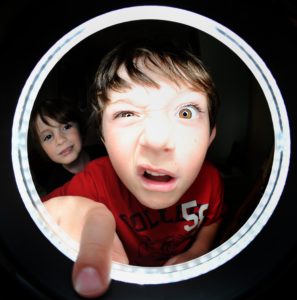
Photo by frank mckenna on Unsplash
All content on this site ©2017
Jennifer Rose
except where otherwise noted
by Jenny Rose | Oct 19, 2017 | A Flourishing Woman, Mind
Make yourself useful!
Can’t you find something productive to do?
Do those words sound familiar? Yeah. Me, too.
I was raised with a strong work ethic and a strong volunteer ethic. Both have been solid foundations in my life, except for one thing:
Our cultural definition of work.
Work: That activity that imprisons so many of us into a schedule, into a car, into rush hour. That large piece of our life in which we must perform certain tasks in certain ways according to certain policies and procedures and do nothing else. That arena in which we compete and prostitute our power to an (all too often) toxic authority.

Photo by Nabeel Syed on Unsplash
Work as defined by someone else and enforced through our fear of losing a paycheck. Usefulness as defined by someone else. Productivity as defined by someone else.
Then there’s workaholism. I’ve been closely connected to more than one workaholic. I used to think workaholism was a meaningless riff on alcoholism, but one day I explored it more closely because it was destroying a relationship. I bought a book (I know you’re shocked), Chained to the Desk, by Bryan E. Robinson, Ph.D., and I read it and wept. I recognized a pattern I’d lived with my whole life: A pattern of unavailability.
Workaholism describes a dynamic in which we become entirely consumed by one idea or activity. Most commonly, it’s a job, but it can also manifest with volunteer work, hobbies and interests, recreational activities or ideologies like religion. Oh, and let’s not forget addiction. During active addiction as well as recovery, some lives remain centered on whatever the addiction is or was. There’s no room for anything else.
The workaholic has a primary relationship, just like an addict, and that primary relationship is all-consuming of his/her time and energy, although most of them will never, ever admit it. Workaholics are compulsively driven, self-destructive, unable to make choices, usually in denial, and they destroy relationships. They view themselves as frantically and endlessly trying to keep all the balls in the air: Family, partner, household, friends and work. Those of us connected to them experience chronic unavailability and abandonment from them and helplessly watch as they become steadily more overwhelmed, exhausted, disconnected, ill and miserable. Trying to talk about it only makes it worse.
Workaholism often begins because we are captivated by an activity we love. We have a sense of mastery and competence, or a sense of contribution. The activity seems to give us a connection to our own power. Sometimes we earn money, or recognition, or develop social bonds, or experience some other payoff that we can’t get enough of and can’t do without. Whatever it is we’re engaged with is familiar. It’s not uncomfortable, uncertain or uncontrollable. We understand what we’re doing. We can succeed at it. It doesn’t frighten or threaten us. When we’re engaged with it we’re not doing anything else. It’s the perfect distraction. We can’t be expected to do anything else. We’re not supposed to be doing anything else. We have no time for anything else. We’re working!
Meanwhile, the rest of the workaholic’s life, all the complicated, messy stuff, becomes a smoking crater. The larger the crater grows, the harder the workaholic works in order to avoid managing or facing it.
It’s a dreadful, destructive cycle.
Some people on the other end of the spectrum from the old 9-to-5, 40-hour-a-week paradigm are talking about unjobbing. Unjobbing challenges the traditional Calvinist work ethic so many of us were raised with. It explores the territory between a 40-hour-a-week job and chronic unemployment supported by foodstamps and other social subsidies. I’ve read a lot about it over the last two or three years.
Unjobbing does not imply that one doesn’t work, just that we define it more precisely, or maybe less precisely. Maybe we should stick with the classic meaning of work as an activity involving effort done in order to achieve a purpose or result, and let any reference to jobs go.
This morning, as usual, I took a walk. I took a bucket with me, because the trees are dropping their cones and I make handcrafted wreaths and other art with them. (When I lived in Colorado, I bought all these cones. Now I take a bucket on my walk and pick them up! I love it.)
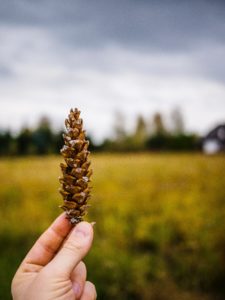
Photo by Michał Grosicki on Unsplash
Eastern White Pine
Anyway, as I walked I thought about all this: Work, unjobbing, workaholism, income sources. I groped around in the terminology, in my guilt and shame about not wanting to work in the way I’ve done all my life, and poked at my deeply-rooted belief that everyone must work! I thought about how expensive it can be to work, in education, in time, in energy, in clothing and equipment, in gas and transportation, in child care, in taxes and “benefits,” in self-respect and power and joy. I thought about work as a limitation, perhaps one of the biggest limiting factors in our lives.
It occurred to me that what I really want is a seamless life. I don’t want my life to look like: Work For Pay. Relationship. Creativity. Housework. Errands. Relaxation. Exercise. Volunteerism. Play. I can do more than live in a series of small boxes, much, much more. I can be more.
I want my life to be like my morning walk. I don’t set an alarm or adhere to any other kind of schedule in order to do it. It’s not a chore; I do it because I want to. It starts my day with exercise. It’s meditative, grounding and centering. It refuels my creativity. It reconnects me to my spiritual source. It provides free resource with which I can earn money and do something I love to do.
All this in a 45-minute walk. Useful. Productive. Joyful. Simple. Free. Seamless.
A seamless life. I don’t know if I can create such a life. I only just this morning identified what I really want. I’m not going to discuss with the voices in my head whether my desire is appropriate, allowed, shameful or possible. Such a discussion isn’t useful. I’ve worked all my life, for a paycheck, as a volunteer, in a household and as a parent. If I have to go back to a traditional job, I will.
But I’m going to try damned hard to find a better way.

Photo by Jon Flobrant on Unsplash
All content on this site ©2017
Jennifer Rose
except where otherwise noted
by Jenny Rose | Oct 12, 2017 | A Flourishing Woman, The Journey
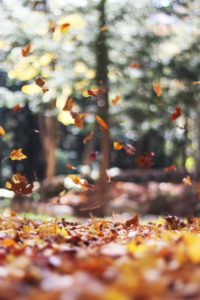
Photo by Autumn Mott on Unsplash
I love autumn, and autumn in New England is particularly poignantly beautiful. The leaves, oh the leaves! It’s as though the trees release their passion in one final gasp of ecstasy before their long sleep. The colors stun the senses with their beauty; it’s almost too much to absorb. Yet the trees’ splendor is fleeting. Inexorably, the leaves fall like golden tears, like blazing sparks, and as they fall the greatest power of all is revealed: The true shape of things.
The green and fiery sea of the forest and fields recedes. Lichen-covered rocks bare themselves. Trees stand or lean in bony beauty, gnarled and hollow, smooth and upright, each species clad in its own color and texture, but now the colors are russet and ivory, shades of brown and grey touched with black. Thorns and stems become semi-transparent cover for winter-colored birds and animals.
The bare forest is everything it is and nothing it is not.
I, too, am becoming reduced to my essential self. Confusion, guilt and shame are loosening their hold on me and drifting away, and I make a resting place for them in my writing. I look back in my memory and, for the first time, begin to see the true shape of things. All the words that weighed me down and kept me small, all the gaslighting and controlling, all the lies and distortions, are responding to some miraculous internal seasonal shift and slant of light. I am bursting into triumphant understanding, and then letting go, letting all that does not serve me fall away. My true shape emerges, and it’s strong and clear-seeing and wise. It always was.
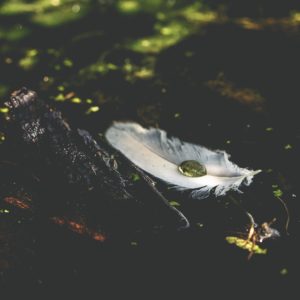
Photo by Erik Stine on Unsplash
Now I begin to see the true shape of things. Now begins a season without pretense, unencumbered by expectations. Now the lineaments of my feelings lie bare. The landscape of my life becomes stark and uncomplicated, a walk through winter woods where a feather is a feather, a quill a quill and a swatch of fur on a thorn exactly what it is, not more, not less, not something else entirely. I reclaim the dignity of my own perception, intuition and experience.
It does not surprise me that traditionally this is the time of year when the veil between the worlds thins, ghosts walk, legends come to life, ancestors are honored, and we acknowledge that which haunts us. I do not fear my ghosts. Indeed, they’re old friends and companions. My bogeymen were flesh and blood concealed beneath dazzling costumes of false power, fearful only as long as their true shape was hidden from me.
Some fear the fading light, endings and truth. Some prefer the riot of distraction and confusion. Some refuse to see or know the true shape of things. My own courage is not strengthened by distraction, no matter how beautiful or seductive. My courage is a thing of unadorned simplicity, spare and clean as bone.
The leaves fall, ravishing, rapturous. At last, the true shape of things emerges from the blaze, pure and indestructible, and I embrace it like a lover.

Photo by Vanessa von Wieding on Unsplash
All content on this site ©2017
Jennifer Rose
except where otherwise noted
















